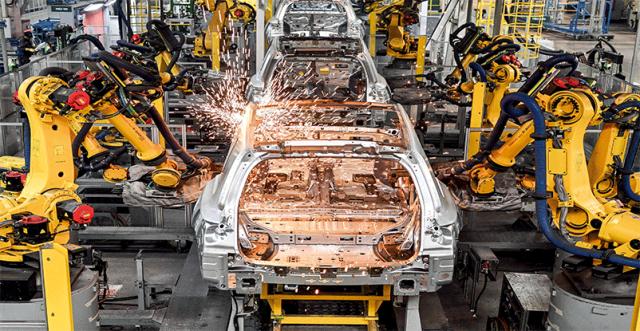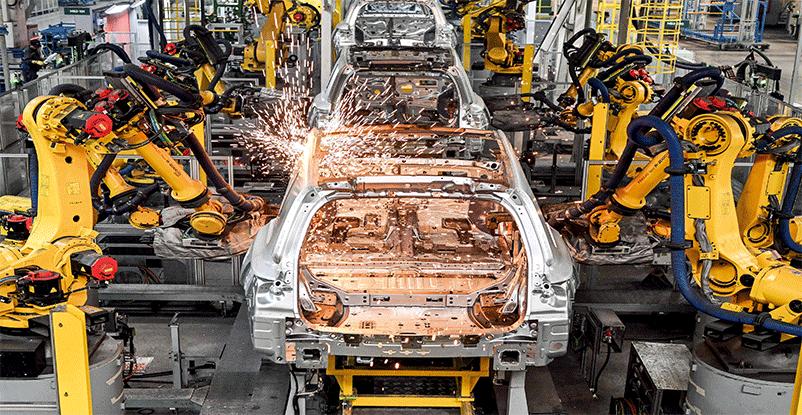
Robotic arms weld a car on an automated assembly line for Li Auto, a popular Chinese electric vehicle brand, at their factory in Changzhou, Jiangsu Province, January 10, 2024 (Photo by Xinhua)
On March 4 and 5, China kicked off its annual meetings of the National People’s Congress (NPC), the legislature, and the National People’s Political Consultative Conference (NPPCC), the country’s top political advisory body, in Beijing. Known colloquially as the two sessions, the meetings are one of the most important events on China’s political agenda.
On March 5, Chinese Premier Li Qiang delivered the annual Government Work Report, the keynote document of the annual event, which set a growth target of “around 5 percent” for 2024. The report also set a range of economic and social goals concerning the financial sector, employment, social security and the environment.
While national economic indicators and targets have long been a major focus of interest for the annual event, one of the biggest highlights of the two sessions was the official adoption of the concept of “new quality productive forces” as a national strategy, not only to achieve the country’s growth and livelihood goals, but more importantly, to develop and upgrade China’s economy in the long term.
In the government work report, “developing new quality productive forces at a faster pace,” along with “modernizing the industrial system,” was identified as the top priority on the list of ten “major tasks for 2024.”
The idea of building “new quality productive forces” was raised for the first time by General Secretary of Communist Party of China (CPC) Central Committee and Chinese President Xi Jinping during his inspection tour of the northeastern province of Heilongjiang in September 2023, when he said that “resources for sci-tech innovation should be integrated to guide the development of strategic emerging and future industries, so as to form new quality productive forces.”
Xi again raised the concept in a speech delivered at the Central Economic Work Conference in December 2023. Reiterating the importance of developing “new quality productive forces,” Xi called for promoting industrial innovation through technological innovation, “especially by using groundbreaking and cutting-edge technologies to foster new industries, new models and growth drivers, and develop new quality productive forces.”
“In the period between 2020 and 2023, President Xi has repeatedly highlighted the importance of developing emerging and future industries and promoting high-quality development, which led to the systematic formulation of the concept of ‘new quality productive forces,’” Liu Dian, an associate researcher at Fudan University’s China Institute, told NewsChina.
Liu noted that Xi’s remarks, made while presiding over a group study session of the Political Bureau of the CPC Central Committee on January 31, offered a complete explanation on how to define “new quality productive forces” for the first time.
“New quality productive forces mean advanced productivity that is freed from traditional economic growth modes and productivity development paths, and features high technology, high efficiency and high quality, and is in line with the new development philosophy,” Xi said.
Xi added that “new productive forces are driven by revolutionary technological breakthroughs, innovative allocation of production factors, and deep industrial transformation and upgrading, taking the improvement of workers, means of labor, subjects of labor and their optimal combinations as its basic connotation, and a substantial increase in total factor productivity as its core hallmark.”
According to Liu, the meeting elevates the importance of developing new quality productive forces to a mode of strategic significance. It is believed that the concept will become the new development paradigm as the country seeks to find new growth engines and upgrade its economy as the US continues to step up its efforts to restrict China’s access to advanced technologies and products.
“From a global perspective, the emergence of the concept was inevitable, as the current round of the technological, industrial and productivity revolution has entered an explosive growth stage,” said Cai Zhibing, an associate professor of economics at the Party School of the CPC Central Committee. “From a domestic perspective, the proposal of new quality productive forces serves as an essential tool to support the country’s high-tech sector to attain substantive achievements,” Cai added.
The government work report identified certain industries as new quality productive forces. “We will formulate development plans for the industries of the future, open up new fields such as quantum technology and life sciences, and create a number of zones for pioneering the development of future-oriented industries,” the report read.
The report also pledged that the government will increase its inputs over a range of high-tech fields, including “intelligent connected new-energy vehicles,” hydrogen power, new materials, innovative drugs, bio-manufacturing, commercial spaceflight and the low-altitude economy, including aviation.
China has made impressive progress in emerging industries. Throughout 2023, exports of new energy vehicles (NEVs), lithium-ion batteries and photovoltaic (PV) panels surpassed the milestone trillion-yuan threshold to reach 1.06 trillion yuan (US$147b), up by 29.9 percent from last year.
In 2023, exports of mechanical and electrical products accounted for 58.6 percent of China’s total export value, while exports of labor-intensive products dropped to 17.3 percent.
According to many Chinese experts, what sets apart the “new quality productive forces” strategy from other initiatives is that it stresses the importance of taking a systemic and holistic approach to fostering innovation.
Developing new quality productive forces presents “entirely new requirements for innovation models, resources allocation and industrial organization, which can only be achieved through a systemic transformation,” Jin Li, a professor of finance from Peking University, told NewsChina. Jin stressed that China needs to take advantage of its “whole-nation” approach to conduct institutional and regulatory reforms to nurture the development of new quality productive forces.
Since the concept of new quality productive forces was suggested, the governments of more than 10 provinces and municipalities, ranging from coastal Guangdong, Shanghai, Zhejiang and Jiangsu, to the inland regions of Sichuan, Chongqing and Hunan, have released policies to support the initiative in their own government work reports for 2024.
But experts warned that local and regional governments should be prudent in their implementation of the policy. “There is a clear regional disparity in the development of new quality productive forces,” Hu Ying, a professor of political science from the Guangzhou-based Sun Yat-Sen University, told NewsChina. Digital industries, for example, are mostly concentrated in first-tier cities, Hu said, adding that provincial and regional governments must adopt pragmatic approaches and aim for tangible results.
In a deliberation session with delegates from Jiangsu Province held on the sidelines of the NPC, President Xi stressed that “localities should take into account their own resource endowment, industrial foundation and scientific research conditions in promoting the development of new industries, models and growth drivers in a selective manner,” instead of enacting “a headlong rush into projects and the formation of industry bubbles.”
For Wei Chonghui, a political scientist from Shanghai Jiao Tong University, as developing new quality productive forces has been identified as the top task of China’s central government, local governments must not make reckless investments in pursuit of short-term political gains. “Developing new quality productive forces will be a long-term process and we cannot rush it,” Wei said, stressing that “the immediate goal of the strategy should be to stabilize market expectations.”

 Old Version
Old Version
